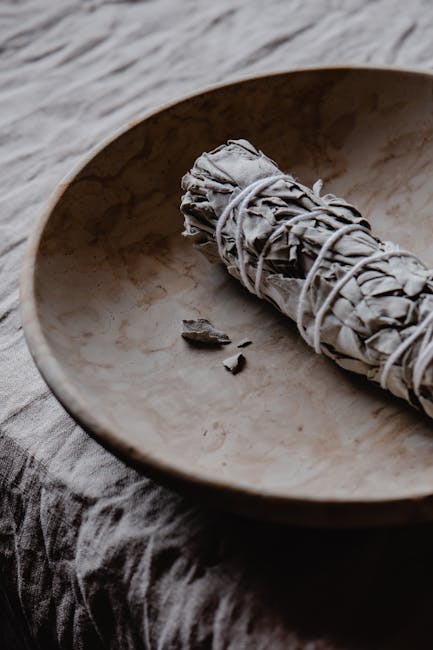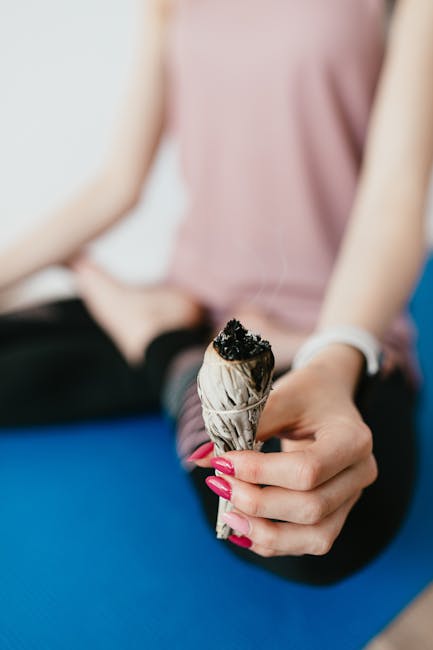Harnessing the Power of Nature: Healing with Herbs and Rituals
Introduction to Harnessing the Power of Nature

Harnessing the Power of Nature involves utilizing herbal healing traditions and incorporating rituals to promote holistic wellness. By understanding the history and science behind herbal remedies, as well as the connection between nature and healing energy, you can enhance your healing practices. Incorporating popular herbs like lavender and ginger into your routine, along with nature-based rituals, can support mental, emotional, and physical well-being. To harness the power of nature, bring together herbs, rituals, and nature in your daily life for a balanced and harmonious approach to healing. Here are some practical tips for incorporating herbal healing and rituals into your routine:
- Research different herbs and their therapeutic properties to find those that align with your specific needs.
- Experiment with various herbal remedies such as teas, tinctures, or essential oils to discover what works best for you.
- Create your own rituals by setting intentions, using visualization techniques, or practicing mindfulness during your healing practices.
- Spend time in nature regularly to connect with its healing energy and incorporate elements like water, earth, fire, or air in your rituals.
- Seek guidance from experienced herbalists or holistic practitioners who can provide personalized recommendations for your well-being journey.
By embracing the power of nature through herbs and rituals, you can tap into its inherent wisdom and unlock a natural path to healing and wellness.
The importance of herbal healing traditions

Herbal healing traditions have played a vital role in promoting holistic wellness throughout history, offering natural remedies for various ailments and supporting overall well-being. By harnessing the power of herbs, individuals can tap into the healing properties of nature and incorporate them into their daily lives.
Exploring the significance of rituals in natural healing
Rituals play a significant role in natural healing by providing a sense of structure and intention, creating a sacred space for healing practices, and enhancing the mind-body connection.
Understanding Herbal Remedies

Herbal remedies have a rich history and offer a natural approach to healing. They harness the therapeutic properties of plants to promote wellness and address various health concerns. Here are some key points to understand about herbal remedies:
- Herbal remedies have been used for centuries in different cultures around the world for their medicinal properties.
- These remedies involve using various parts of plants, such as leaves, flowers, roots, and bark, in different forms like teas, tinctures, or capsules.
- Each herb has specific healing properties and can be used to target specific ailments or support overall well-being.
- Scientific research is ongoing to understand the active compounds in herbs and their effects on the body.
- When using herbal remedies, it's important to consider factors such as dosage, potential interactions with medications, and individual sensitivities or allergies.
- Consulting with a qualified herbalist or healthcare professional can provide personalized guidance and ensure safe and effective use of herbal remedies.
By understanding herbal remedies and their potential benefits, you can incorporate these natural alternatives into your wellness routine and support your overall health.
Herbal remedies: A brief history and overview
Herbal remedies have a rich history and offer a natural approach to healing. They harness the therapeutic properties of plants to promote wellness and address various health concerns. These remedies involve using various parts of plants, such as leaves, flowers, roots, and bark, in different forms like teas, tinctures, or capsules. Each herb has specific healing properties and can be used to target specific ailments or support overall well-being. Scientific research is ongoing to understand the active compounds in herbs and their effects on the body. When using herbal remedies, it's important to consider factors such as dosage, potential interactions with medications, and individual sensitivities or allergies. Consulting with a qualified herbalist or healthcare professional can provide personalized guidance and ensure safe and effective use of herbal remedies.
By understanding herbal remedies and their potential benefits, you can incorporate these natural alternatives into your wellness routine and support your overall health.
The science behind the healing properties of herbs
The science behind the healing properties of herbs lies in the active compounds they contain, which interact with the body to promote wellness and address specific health concerns. Researchers continue to study these compounds to better understand their effects and potential benefits.
Rituals for Holistic Wellness

Incorporating rituals for mental and emotional well-being:
- Start your day with a mindfulness meditation or gratitude practice.
- Create a calming ritual before bed, such as taking a warm bath or practicing gentle stretching.
- Use essential oils or incense to create a soothing atmosphere during rituals.
- Practice journaling or creative expression as a way to process emotions and promote self-reflection.
- Engage in activities that bring you joy and relaxation, such as gardening, painting, or listening to music.
Using nature-based rituals for physical health benefits:
- Take regular nature walks or engage in outdoor activities to connect with the healing power of nature.
- Incorporate herbal remedies into your daily routine, such as drinking herbal teas or using herbal-infused skincare products.
- Practice grounding exercises, such as walking barefoot on grass or sand, to promote physical balance and well-being.
- Experiment with natural remedies and techniques, such as aromatherapy or herbal compresses, for specific physical ailments.
- Create a sacred space in your home or garden where you can perform healing rituals and connect with the elements.
Incorporating rituals for mental and emotional well-being
Start your day with a mindfulness meditation or gratitude practice to cultivate mental and emotional well-being.
Create a calming ritual before bed, such as taking a warm bath or practicing gentle stretching, to promote relaxation and better sleep.
Use essential oils or incense to create a soothing atmosphere during rituals and enhance the mood.
Practice journaling or creative expression as a way to process emotions and promote self-reflection.
Engage in activities that bring you joy and relaxation, such as gardening, painting, or listening to music, to nurture your mental and emotional state.
Using nature-based rituals for physical health benefits
Using nature-based rituals for physical health benefits can involve practices such as forest bathing, grounding exercises, and herbal remedies like chamomile tea or turmeric supplements to reduce inflammation and promote overall well-being.
Popular Healing Herbs to Incorporate
When it comes to incorporating popular healing herbs into your wellness routine, herbs like lavender and ginger can provide various benefits such as relaxation, pain relief, and improved digestion. Here are some ways to effectively use these herbs for healing:
- Lavender: Known for its calming properties, you can use dried lavender in a sachet or essential oil form for aromatherapy. Try adding a few drops of lavender oil to your bathwater or using it in a diffuser to promote relaxation and better sleep.
- Ginger: This herb is known for its anti-inflammatory and digestive properties. You can make ginger tea by steeping fresh ginger slices in hot water for about 10 minutes. Sip on this tea to soothe an upset stomach or relieve nausea.
- Herbal Infusions: Another way to incorporate healing herbs is through herbal infusions. Choose herbs like chamomile or peppermint and steep them in hot water for a soothing and therapeutic beverage.
- Culinary Uses: Many healing herbs can be used in cooking as well. For example, adding fresh basil to your pasta sauce or using turmeric in curries can provide both flavor and health benefits.
Remember to consult with a healthcare professional before incorporating any new herbs into your routine, especially if you have any underlying health conditions or are taking medications that may interact with certain herbs. Harnessing the power of popular healing herbs can enhance your well-being and support your body's natural healing processes.
Exploring the benefits of popular herbs like lavender and ginger

Lavender and ginger offer numerous benefits - lavender promotes relaxation and better sleep, while ginger provides anti-inflammatory and digestive properties. Incorporate them through aromatherapy, herbal infusions, or culinary uses.
How to use herbs effectively in your healing practices

When using herbs for healing practices, it is important to consider the most effective methods. Here are some practical tips to help you maximize the benefits of herbs in your healing journey:
- Choose the right herbs: Research different herbs and their specific therapeutic properties to find the ones that align with your health goals.
- Opt for high-quality herbs: Ensure that you are using organic, fresh, or dried herbs to ensure their potency and effectiveness.
- Herbal infusions: Make herbal teas by steeping dried herbs in hot water for a specific duration to extract their medicinal properties. Strain and drink the infusion.
- Herbal tinctures: Create concentrated herbal extracts by soaking herbs in alcohol, vinegar, or glycerin. Use a dropper to consume tinctures in small doses.
- Topical applications: Apply crushed or powdered herbs directly to the skin as salves, poultices, or compresses for localized healing effects.
- Culinary uses: Incorporate herbs into your cooking to enjoy their health benefits. Add them to soups, stews, salads, or infuse them into oils and vinegars.
- Essential oils: Extracted from herbs, essential oils can be used aromatically, topically, or internally for therapeutic purposes. Use them in diffusers or dilute with carrier oil before applying to the skin.
- Herbal capsules or tablets: If you prefer a convenient option, herbal supplements in capsule or tablet form are available for easy consumption.
Remember to consult with a healthcare professional or herbalist before starting any new herbal regimen, especially if you have existing health conditions or are taking medication. By using herbs effectively in your healing practices, you can harness their natural power for improved well-being.
Enhancing Healing with Nature's Power
Harnessing the power of nature in healing practices involves connecting with the natural world and its healing energy. By incorporating elements like plants, water, earth, and fire into rituals, you can enhance the healing process. Use herbs in your rituals and take advantage of their natural therapeutic properties. For example, burn dried herbs as smudge sticks to cleanse and purify your space, or create herbal baths by infusing herbs in hot water to promote relaxation and balance. Remember to respect and honor nature while practicing these rituals.
The connection between nature and healing energy
The connection between nature and healing energy lies in the fact that nature offers a powerful source of healing energy that can promote physical, emotional, and spiritual well-being. By immersing yourself in nature, whether through activities like forest bathing or simply spending time outdoors, you can tap into this healing energy and experience its rejuvenating benefits.
Harnessing the power of elements in natural healing rituals
Harnessing the power of elements in natural healing rituals involves incorporating Earth, Air, Fire, and Water to enhance the healing process. For example, using crystals or stones (Earth) for grounding, practicing deep breathing exercises (Air) for relaxation, lighting candles (Fire) for energy and focus, and utilizing water for cleansing and rejuvenation. By connecting with these elements, you can deepen your healing experience and promote overall well-being.
Conclusion and Practical Tips
- Combining the power of herbs, rituals, and nature can lead to holistic wellness.
- Incorporate herbal healing by using therapeutic herbs like lavender and ginger.
- Practice nature-based rituals for mental, emotional, and physical well-being.
- Connect with the elements of Earth, Air, Fire, and Water in your healing rituals.
- Explore the science behind the healing properties of herbs to understand their effectiveness.
- Implement practical tips such as creating a soothing herbal tea or incorporating aromatherapy into your daily routine.
By integrating these practices into your life, you can harness the power of nature for healing and well-being.
Bringing together herbs, rituals, and nature for holistic wellness
Bringing together herbs, rituals, and nature is key to achieving holistic wellness. Incorporate herbs like lavender and ginger into your rituals for their therapeutic benefits. Connect with the elements of Earth, Air, Fire, and Water in your healing practices. By integrating these practices, you can harness the power of nature for overall well-being.
Practical tips for incorporating herbal healing and rituals in your daily life
- Set aside dedicated time each day for meditation or mindfulness practices to enhance the healing effects of herbs and rituals.
- Incorporate aromatherapy with essential oils derived from herbs like lavender or eucalyptus to promote relaxation and balance.
- Take advantage of the healing power of plants by growing your own herb garden and using fresh herbs in cooking or making herbal remedies.
- Explore different types of herbal remedies, such as tinctures, teas, or poultices, to find what works best for your specific health needs.
- Seek guidance from herbalists or naturopathic practitioners for personalized advice on incorporating herbs and rituals into your wellness routine.
- Stay consistent with your herbal healing and ritual practices to experience long-term benefits in your overall well-being.
- Experiment with different rituals, such as smudging with sage or practicing yoga in nature, to find what resonates with you on a spiritual level.
- Keep a journal to track your experiences and observations with herbal healing and rituals, noting any improvements in physical, mental, or emotional health.
- Remember that incorporating herbs and rituals into your daily life is a journey of self-discovery and self-care – embrace the process and trust in the power of nature to support your holistic wellness.

Comments
Post a Comment